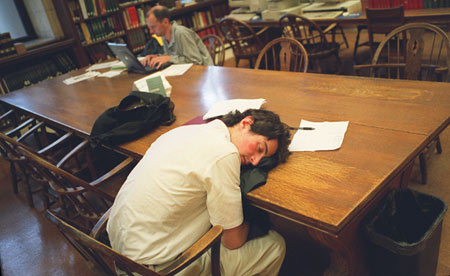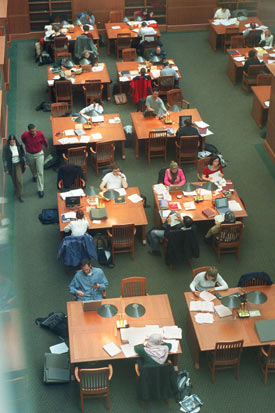A wrinkle in time


Sushi for breakfast? Why not? Why not pizza? Why not chocolate cake?
For that matter, why not have breakfast at 3:30 p.m? After all, you woke up at 3 after reviewing biostatistics until dawn. A nice plate of eggs, sausage, and home fries would go really good right now. That is, if you can find a place that serves breakfast anytime (what about French toast during the Renaissance?).
It all makes perfect sense because you’re not living by the clock anymore. You’re living by the calendar. From May 4 until May 15 is Reading Period, and it doesn’t matter what hours you sleep or eat, or study, as long as by the end of that 12-day chunk of time you’ve got your papers written and you’re ready for final exams.
There’s a curious serenity to Reading Period. You’ve tumbled through the rapids and spillways of lectures and sections and reading assignments, and now you’re becalmed in this vast, gently lapping sea of unstructured time. It almost seems like a vacation, a convalescence, a time to catch up on needed sleep.
But wait! What about that paper about Samuel Johnson’s influence on Jane Austen? There are only four days left and you still haven’t read “Rasselas.” Panic!
Some students prefer to do their studying in the quiet, communal spaces of the libraries, where a hard, oak table may occasionally serve as a pillow. Others eschew such institutional environs and seek out more domestic or more festive haunts.
But no matter where you hang out, you can’t escape the serious, preoccupied faces, the furrowed brows, the sense of intense isolation. No one has a social life, no one’s having any fun, except maybe for switching on WHRB at 2 a.m. to catch a few hours of the Franz Joseph Haydn orgy.
And now here’s Symphony No. 18 in G, 1760, and now here’s the String Quartet in B-flat, 1762, and just like Franz Joseph’s long and prolific career, Reading Period too must come to an end. Structure returns, in the form of deadlines and an exam schedule, and as much as you’ve dreaded it, as much as a doomed, hysterical part of your consciousness screams, “I’m not ready!” the transition does come as some relief.




